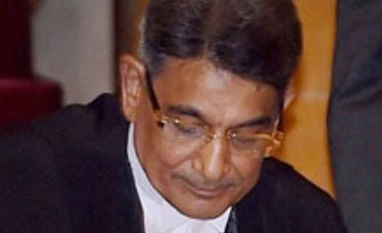Justice Rajendra Mal Lodha, the seniormost judge of the Supreme Court, was today sworn in as the 41st Chief Justice of India by President Pranab Mukherjee.
64-year-old Justice Lodha took over from Justice (retd) P Sathasivam who demitted office yesterday after nine months as the head of the judiciary.
The brief ceremony at Rashtrapati Bhawan's Durbar Hall attended by Vice President Hamid Ansari, Prime Minister Manmohan Singh, some Union ministers, retired and serving judges, members of the Bar, besides Justice Sathasivam.
Justice Lodha, who took oath in the name of god, will have a brief tenure of five months as CJI and is due to retire on September 27, this year.
He is heading the bench which is monitoring CBI's probe into coal blocks allocation scam. He was also instrumental in passing orders making CBI free from any political interference. A bench headed by him had said that CBI does not require sanction from the government to prosecute senior officials in cases being monitored by courts.
It was Justice Lodha's bench which had ordered that CBI will not share information with the political executive on coalgate probe. The judgement had led to the resignation of Ashwani Kumar as the Law Minister in May last year.
He also is part of a Constitution Bench looking into the mode of education of minority schools.
Last month, a bench headed by him had allowed defence personnel in "peace stations" to vote in constituencies where they are posted, saying "compulsions of their job" shouldn't come in the way of a basic right.
Another bench headed by him had stopped clinical trials in the country, saying the interests of the people were more important than those of pharmaceutical companies.
Later, the government framed rules for monitoring of clinical trials and for paying compensation to people affected in the process.
64-year-old Justice Lodha took over from Justice (retd) P Sathasivam who demitted office yesterday after nine months as the head of the judiciary.
The brief ceremony at Rashtrapati Bhawan's Durbar Hall attended by Vice President Hamid Ansari, Prime Minister Manmohan Singh, some Union ministers, retired and serving judges, members of the Bar, besides Justice Sathasivam.
More From This Section
No opposition leader was present at the function.
Justice Lodha, who took oath in the name of god, will have a brief tenure of five months as CJI and is due to retire on September 27, this year.
He is heading the bench which is monitoring CBI's probe into coal blocks allocation scam. He was also instrumental in passing orders making CBI free from any political interference. A bench headed by him had said that CBI does not require sanction from the government to prosecute senior officials in cases being monitored by courts.
It was Justice Lodha's bench which had ordered that CBI will not share information with the political executive on coalgate probe. The judgement had led to the resignation of Ashwani Kumar as the Law Minister in May last year.
He also is part of a Constitution Bench looking into the mode of education of minority schools.
Last month, a bench headed by him had allowed defence personnel in "peace stations" to vote in constituencies where they are posted, saying "compulsions of their job" shouldn't come in the way of a basic right.
Another bench headed by him had stopped clinical trials in the country, saying the interests of the people were more important than those of pharmaceutical companies.
Later, the government framed rules for monitoring of clinical trials and for paying compensation to people affected in the process.
)